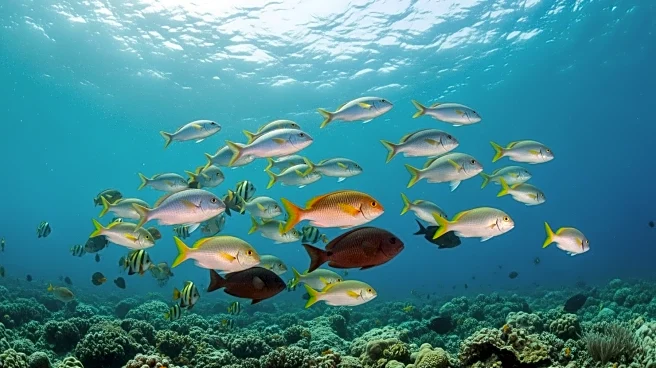What's Happening?
The Danish Pelagic Organisation (DPPO) has been selected to participate in the Science Based Targets for Nature (SBTN) Ocean Pilot, reaffirming its commitment to marine ecosystem protection. The initiative,
led by WWF and Conservation International, aims to develop frameworks for sustainable fishing practices. DPPO's involvement builds on its '2040 Nature Ambition' to achieve carbon-free fishing within 15 years. The collaboration with WSP, a knowledge partner, will enhance efforts to reduce climate and environmental impact. Marine biologists at WSP emphasize the importance of creating tools and guidelines for nature-based practices in the fishing sector.
Why It's Important?
The participation of DPPO in the SBTN Ocean Pilot highlights the growing emphasis on sustainable fishing practices and marine conservation. By integrating science-based targets into corporate sustainability strategies, the initiative aims to protect marine biodiversity and ensure the long-term viability of ocean resources. This collaboration sets a precedent for other seafood producers and fishing organizations to measure and report progress in reducing their environmental impact. The initiative is crucial for maintaining healthy ecosystems that provide essential services such as food, carbon capture, and oxygen production.
What's Next?
The pilot will inform global guidance on sustainable fishing practices, with DPPO playing a key role in developing frameworks for environmental stewardship. The collaboration is expected to lead to the creation of effective tools and guidelines that promote responsible fishing practices. As the initiative progresses, stakeholders in the fishing industry will need to adapt to new standards and practices to ensure compliance and contribute to global conservation efforts.
Beyond the Headlines
The initiative underscores the importance of collaboration between industry leaders and conservation organizations in addressing environmental challenges. By aligning policy, finance, and markets, the SBTN Ocean Pilot aims to de-risk innovation and support communities as co-creators of change. The focus on science-based targets reflects a shift towards evidence-based decision-making in environmental conservation.









